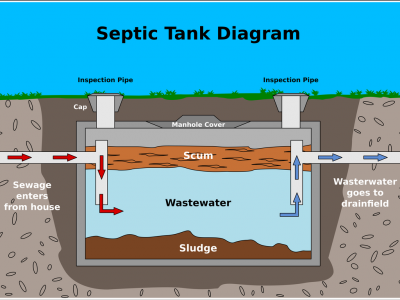
Improve Your Septic IQ
During the coronavirus pandemic, many new and would-be homebuyers are choosing properties far removed from dense city centers, where the suburbs end and the countryside becomes more rural. In these areas, your home might be connected to a private septic system instead of public sewers.
If you aren’t familiar with septic systems, what should you know?
1. There are many different types of septic systems.
The design and size of a septic system vary, depending on soil conditions, the slope and size of your lot, the groundwater table’s depth, the number of people using the system, and other factors.
The differences between systems usually refer to the drain field—how wastewater (also called effluent) is dispersed after it leaves the septic tank.
For example, most conventional systems distribute the wastewater through a collection of drain pipes buried in trenches and surrounded by gravel. On the other hand, chamber systems skip the gravel and position open-bottom pipes wrapped in fabric directly into trenches.
2. Septics are living systems.
Unlike city sewers, a septic system (and its related drain field) is an organic, living system. It works by using helpful bacteria to “eat” and decompose your organic waste. As such, it’s essential to help it stay healthy, so it can work as intended.
Toilets, sinks, bathtubs, showers, dishwashers, and washing machines all drain into your septic system. To keep the system healthy, don’t add anything that will slow the digestive process or damage its ecosystem.
3. Don’t kill the workers or clog the system!
Water, bodily waste, and toilet paper are the only things you should flush down your toilets and into your septic system. Dispose of any feminine or latex products in the trash. Before flushing any diaper wipes, make sure they’re septic safe—ditto for toilet cleaning products.
Avoid using anti-bacterial soaps since these are specially formulated to kill bacteria!
In your laundry, avoid fabric softeners and bleach. Select phosphate-free laundry and dishwashing detergent.
Food particles tend to take longer to break down, so scrape your plates into the trash or your compost bucket instead of running them down the garbage disposal or through your dishwasher.
Fats, oils, and grease are also problems for septic systems since bacteria do not easily break these materials down. Also, oily substances tend to stick to the sides of pipes, trapping other debris and creating clogs.
Many cosmetics contain heavy metals like zinc, chromium, silver, cadmium, and titanium, which will not degrade and contaminate groundwater. Instead of washing cosmetics down the sink, remove them with cotton pads, disposable wipes, or a washcloth.
Avoid other harmful chemicals, like paint thinners, gasoline, coolants, pesticides, and pharmaceutical products. Also, try not to drain rinse water from cleaning latex paintbrushes into your septic system.
4. Don’t “flood” your septic.
If too much water enters the system at once, it can overwhelm your septic tank and dilute or wash away essential bacteria. In some cases, excess water can also cause a septic system to back up into your home!
Try to space out your laundry duties instead of doing multiple loads in one day. And consider using high-efficiency appliances, like washing machines, dishwashers, showerheads, and water-saving toilets.
5. Protect the drain field.
Never drive over your drain field since this might crush the drainpipes. Do not plant trees or allow trees to grow too close to the drain field since the roots may damage or invade the drainpipes. Also, prevent rainwater runoff from flowing into and accumulating in your drain field.
6. Maintain the system regularly.
Depending on your usage, it’s a good idea to pump out the system every two to five years. This will remove any solids that were not properly digested by the bacteria and will prevent clogs in your drain field, which will extend the life of the system dramatically and save you the headaches and expense of a failed septic system.
Add septic maintenance records to your household notebook so you can show a future buyer, should you decide to sell your home, that the system has been well maintained.
A failing septic system is not only inconvenient; it’s also an expensive repair. Keeping your septic system healthy and durable will save you time, hassle, and a great deal of money. The proper care and feeding of your septic system is a worthwhile investment!
